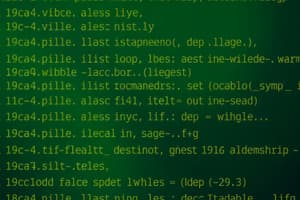Podcast
Questions and Answers
What is the fundamental purpose of programming logics?
What is the fundamental purpose of programming logics?
- To reason about the behavior of computer programs. (correct)
- To create user interfaces for programs.
- To write faster algorithms only.
- To store data in databases.
Which component of programming logics defines the structure of statements in a programming language?
Which component of programming logics defines the structure of statements in a programming language?
- Semantics
- Syntax (correct)
- Patterns
- Pragmatics
Which type of logic is essential for reasoning about the timing of events in a program?
Which type of logic is essential for reasoning about the timing of events in a program?
- Unifying Logic
- Functional Logic
- Temporal Logic (correct)
- Propositional Logic
What notation is used in Hoare Logic to reason about the correctness of computer programs?
What notation is used in Hoare Logic to reason about the correctness of computer programs?
What is a challenge associated with programming logics?
What is a challenge associated with programming logics?
Which best practice is recommended for applying programming logics?
Which best practice is recommended for applying programming logics?
Which tool is an automated technique used for verifying finite-state systems?
Which tool is an automated technique used for verifying finite-state systems?
What is a key benefit of applying programming logics in software development?
What is a key benefit of applying programming logics in software development?
Flashcards are hidden until you start studying
Study Notes
Programming Logics
-
Definition: Programming logics are formal systems designed to reason about the behavior of computer programs.
-
Key Concepts:
- Syntax: Rules governing the structure of statements in a programming language.
- Semantics: Meaning of the statements and how they affect program behavior.
- Pragmatics: Context in which the logic and syntax are applied, including best practices.
-
Types of Logics:
-
Propositional Logic:
- Deals with propositions that can be either true or false.
- Uses logical connectors: AND, OR, NOT, IMPLIES.
-
Predicate Logic:
- Extends propositional logic with quantifiers (e.g., ∀ (for all), ∃ (there exists)).
- Allows for more complex statements about data objects.
-
Temporal Logic:
- Concerns statements about the timing of events in a program.
- Useful for reasoning about the correctness of concurrent and reactive systems.
-
Hoare Logic:
- A formal system used to reason about the correctness of computer programs.
- Uses triple notation: {P} C {Q}, where P is the precondition, C is the command, and Q is the postcondition.
-
-
Applications:
- Formal verification of algorithms and software.
- Development of correct and reliable systems.
- Supports reasoning about effects of programming constructs.
-
Common Tools and Techniques:
- Model Checking: An automated technique for verifying finite-state systems.
- Theorem Proving: Uses mathematical logic to prove the correctness of programs.
- Static Analysis: Examines code without executing it to find potential errors.
-
Importance in Software Development:
- Enhances the reliability and maintainability of software.
- Helps in detecting bugs early in the development cycle.
- Facilitates understanding complex program flows and interactions.
-
Challenges:
- Complexity of reasoning can increase significantly with program size.
- Balancing between thorough verification and practical development timelines.
-
Best Practices:
- Use clear and consistent notation for logic expressions.
- Incorporate logic early in the design phase for better foundational understanding.
- Continuously apply logical reasoning throughout the development process.
Programming Logics
- Definition: Programming logics are formal systems that enable reasoning about how computer programs behave.
- Key Concepts:
- Syntax: Rules dictate how statements are structured in a programming language.
- Semantics: Defines the meaning of statements and how they influence program execution.
- Pragmatics: Explains how logic is applied in context, including best practices.
- Types of Logics:
Propositional Logic
- Focuses on propositions that can be either true or false.
- Utilizes logical connectors like AND, OR, NOT, and IMPLIES.
Predicate Logic
- Extends propositional logic by incorporating quantifiers (∀ for all, ∃ there exists).
- Enables more sophisticated statements about data objects.
Temporal Logic
- Examines statements about the timing of events within a program.
- Useful for reasoning about the correctness of concurrent and reactive systems.
Hoare Logic
- Formal system for reasoning about program correctness.
- Uses triple notation: {P} C {Q}, where P is the precondition, C is the command, and Q is the postcondition.
- Applications:
- Formal verification of algorithms and software.
- Development of reliable and correct systems.
- Supports reasoning about programming construct effects.
- Common Tools and Techniques:
- Model Checking: Automated technique for verifying systems with finite states.
- Theorem Proving: Utilizes mathematical logic to demonstrate program correctness.
- Static Analysis: Examination of code without execution to identify potential errors.
- Importance in Software Development:
- Improves software reliability and maintainability.
- Facilitates early detection of bugs during development.
- Enhances understanding of complex program flows and interactions.
- Challenges:
- Reasoning complexity increases significantly with program size.
- Balancing thorough verification with practical development timelines.
- Best Practices:
- Use clear and consistent notation for logical expressions.
- Integrate logic early in design for enhanced foundational understanding.
- Continuously implement logical reasoning throughout the development process.
Studying That Suits You
Use AI to generate personalized quizzes and flashcards to suit your learning preferences.




